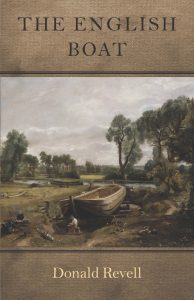by JESSICA DREXEL

Donald Revell, The English Boat (Alice James, 2018), pp. 100
“…Straight path along the dusky path homewards
Ordinariness spent no otherwise
Labor and bafflement without ending
Green corduroy copper hair then eyes
Wild with tangling underwood pleasure
In the dimness of the stars’ pleasure
Pierced to the heart things said things said
Homlihed out of honey into Chaucer
Christ of bees babe of swarms weak not vacant
Winter when music when fires in vacant
Rail yard ashcans heavenly life beholden
One whole obdurate English for all saints…”
Donald Revell’s poetry challenges its reader. Even as I type the words above, the images shift and realign in my mind, coming into greater clarity. The first time I read “Devotion,” it was incomprehensible—perhaps unsurprising for a poem inspired by The Cloud of Unknowing, a reflection on contemplative prayer by the fourteenth-century mystic Julian of Norwich. I read the poem again, the fourth in the book, out loud, and more slowly. Then I took pencil to page and drew a web of lead lines between stanzas and lines that repeated the same images. I read the poem one more time and a strange thing happened: all of the images came to life—distinct from each other, but all present in my mind’s eye. Eyes and stars; honey—as a metaphor for the sweetness of home, honey of bees, bees as bees, bees as medieval symbols of Christ. In the flurry of familiar images, one word stood out. Homlihed. I had to look that up, and I was amused that the unfamiliar term was a Middle English word meaning familiarity or “homely love,” which Dame Julian used to describe “Christ making a home in humanity.”
When I understood the word, the “dusky path homewards / Ordinariness spent no otherwise” came into resonance with Homlihed and Chaucer a few lines later. Chaucer’s tales of journeys, my own paths homeward, a sense of ordinariness, and this strange old word—though new to me—flowed together in a pleasant impression that invited further reflection. Home is labor, copper, and corduroy; it is familiar ashcans and railways. Too, his poem suggests, home is a place of divine love in the form of a baby’s body. This home that needles through time and the cosmos is captured in Revell’s language. Through Revell’s obdurate English, symbols are transformed into ordinary objects, and ordinary objects into symbols. The next time I see an ashtray, I may think of Christ or Chaucer.
Preceding “Devotion” is the poem “Utah,” dedicated to Sundin Richards, a former student and friend of Revell’s, and an award-winning poet from Utah. I learned this by attending a public poetry reading by Dr. Revell, in which he introduced the poem by noting that Sundin Richards was lost to suicide, and that although he came from Helper, Texas, “no one helped him.” Although this poem is about Richards, it artfully refracts his story through the lens of his betrothed, who also committed suicide shortly after Richards. In an email exchange after the poetry reading, I asked Dr. Revell more about the poem, and he responded that Richards’s loss is still painful and that The English Boat is indeed “haunted by suicide.” The concept of suicide permeates the collection’s eclectic landscapes of Utah, New York, ancient Greece, and Toulouse, gathering pain, hurt, loss, and compassion into one image, against which I believe Revell offers a poetry of hope and healing. “Devotion” is followed by “Fresh Dante,” a poem that came out of another moment of simultaneous love and loss. In the email interview, Revell explained that “Fresh Dante” grew from the experience of simultaneous presences of two women. While in the French city of Toulouse with his beloved wife, he was unexpectedly haunted by the memory of a first love who was found murdered the day after a dinner date long ago. In this geographical space, the poet contemplates present love and prior loss, which form layers of experience saturating one place throughout time: “The soul of Toulouse rots through. / Creation is one way. Creation / is the other way too.”
Dante informs not just his eponymous poem in The English Boat, but underwrites the whole collection. Though starting in an underworld of death and pain, the collection turns heavenward in a series of poems entitled “Chaplet for Mary: Six Flowers.” In a refreshing revision of the Inferno-Purgatorio-Paradiso trajectory, it seems purgatory is elided from the journey, or else it is stretched out throughout the collection and undergirds each poem. But if purgatory is omnipresent, so is heaven. The Mary sequence delivers readers directly to a homecoming in contemporary urban contexts. In this third part of the book, we encounter New York’s Tappan Zee Bridge, the Hudson River School, tea and bowls of berries, the Norway maples of the Bronx, “Manhattan / As the island was in 1970 / When freedom was a machine,” and baseball. This part of the collection is indeed homely, and it conjures familiar images of modernity. Revell reminds us that Dante’s heaven and hell may be just around the corner, or on the other side of a symbol.

The last two parts of the collection function like a coda to the rest of the book, and they deal directly with the nature of poetry and writing it. Whereas the earlier poems dwell on grief and the inevitability of hurt in this world, this troubling aspect of humanity is ultimately resolved in “Glens of Cithaeron” through the fluidity of symbols. Drawing on the myth of Acteon’s death upon glimpsing the nude goddess Diana, the speaker becomes both hunter and prey, trespasser and redeemed, in agony and at perfect rest; ultimately, the speaker is consumed by Diana’s dogs and also by a higher love. In the following excerpt, a constellation of hunting, love, language, myth, and religious imagery unfolds, reconfigures, and overlaps itself:
“…It is Friday. Stars won’t cross. Actaeon
Never imagined the frail, sheer speed
Of meat. Lord, eat me. Nothing else makes sense.
On the far
Safe side of becoming,
Metaphor
Is all love,
The pure being of each
Nude above
Perfect sense.
I begin to hunt words.
The tension
The soft smile
Of the Goddess eases
A short while
Reappears
In a red stag’s terror.
Metaphor
Leaps and eats.
It is not difficult.
Love is meat.
The dogs leap on Actaeon. He is human…”
This final poem seems to suggest that the paradoxes of triumph and defeat, love and loss, transgression and redemption interwoven throughout times, people, and places, can be explained through poetry, particularly through the layering of multiple interpretations of a single image or symbol in one poem. This technique is particularly noticeable in “Devotion” and “The Glens of Cithaeron.” Revell confirms that in this lively interplay of images, he draws on Emerson’s notion that “we are symbols, and inhabit symbols.” Through this saturated vision and experience, the paradoxes of death and pain are met, countered, and defanged in the redemptive coalescence of the poems. Drawing on myth and Christian theology, Revell’s poetry points toward cosmic renewal, and it yokes ancient beliefs and symbols to contemporary realities in sharp, modern English.
The English Boat is challenging and cryptic, collating dialects and images from Athens and Norwich to Boston and the Bronx, and it demands effort from its reader. These poems show, but they don’t tell; the reader is called to attend to a vast collage of interlocking images, to let themes and things gradually become present, and to awaken imagination. “Imagination is the present state of things,” writes Revell in his 2007 The Art of Attention, “and poems rejoice – in particular, in detail – that this is so.” In attending and perceiving through imagination, the poet’s hope seems to be, as he writes in “The Glens of Cithaeron,” that “our humanness / Crosses into heaven as the new poem.” Revell invites the reader into the boat of the English language, to attend and to journey through the underworld and heaven, and back home to the twenty-first century. On your return, you may notice that the path homewards is both fresh and familiar.

